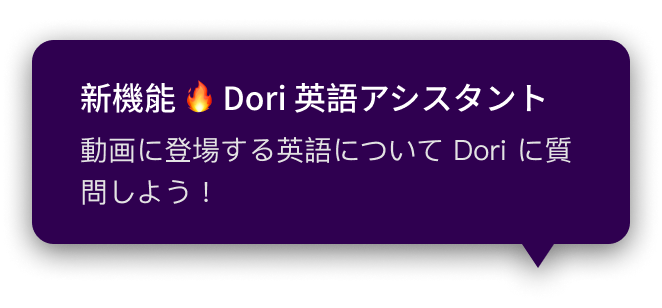字幕表 動画を再生する
-
"How To Speak To People: Better Communication Skills."
「人とどう話すか:より良いコミュニケーションスキル」
-
Hello and welcome to VideoJug.
こんにちは。VideoJugにようこそ。
-
I'm Rebecca Fensome, and I'm a life coach.
私はレベッカ・フェンサム、人生相談の講師です。
-
Being a great communicator is important in all areas of our life.
ちゃんとしたコミュニケーションを取れる人間になることは人生のあらゆる場合において重要なことです。
-
Whether we're talking to our partners,
パートナー、
-
or friends, or work colleagues.
あるいは友人、同僚と話しているかどうかに関わらず。
-
Being able to inspire other individuals through your communication
コミュニケーションによって他の人を動かすことができれば
-
will allow you to have a more fruitful and enriching life.
より豊かな人生を送ることができるでしょう。
-
Here are my top tips to being a good communicator.
これらが高いコミュニケーション能力を持った人間になれる一番の秘訣です。
-
Tip 1.
秘訣その1
-
Use open-ended questions.
オープンな質問を心掛ける
-
In order to get a communication going,
コミュニケーションを潤滑に進めるためには
-
it's really useful to use open-ended questions.
オープンな質問が本当に役立ちます。
-
Open-ended questions often start with words such as:
オープンな質問はほとんどの場合こんな言葉から始まります。
-
what, when, how, and why.
what(何)、when(いつ)、how(どう)、そして、why(なぜ)。
-
An example of an open-ended question is:
オープンな質問の例がこちら。
-
"So what do you like doing in your spare time?"
「で、暇な時は何をするのが好きなの?」
-
"I love cinema, theatre, and sports."
「映画と舞台劇、それと運動かな。」(イギリス英語におけるtheatreはアメリカ英語とスペルが異なるだけでなく、その意味は映画館ではなく舞台劇などが行われる劇場のことである。)
-
It's best to avoid what we call closed questions.
私たちがクローズな質問と呼ぶものを避ける最も良い方法です。
-
An example of a closed question is:
クローズな質問の例がこちら。
-
"Do you like films?"
「映画は好き?」
-
"Yes, I do."
「うん、好きだよ。」
-
A closed question kills the conversation
クローズな質問は会話を終わらせてしまいます。
-
because it can only be answered with a yes or no answer.
はいかいいえでしか答えることができないからです。
-
Careful using these open-ended questions
オープンな質問を心掛ければ
-
will ensure that the conversation continues to flow.
会話が流れるように続くでしょう。
-
Tip two.
秘訣その2
-
Active listening.
積極的に聞く
-
This is a really useful technique.
これはかなり役立つテクニックです。
-
As it tells the other person that you really listened to what they've been saying,
何を言っているかちゃんと聞いていることをその人に伝える
-
and also, more importantly,
そして、もっと大事なこととして
-
that you've understood.
あなたが話を理解していることを伝えることができます。
-
"The hours are quite long."
「時間がすごく長いし。」
-
"The work's really repetitive."
「仕事は同じことの繰り返しで本当につまらないし。」
-
"My boss doesn't appreciate me."
「上司は私のことを評価してくれないの。」
-
If you've been listening actively,
もしあなたが積極的に聞いていれば、
-
at this point you should now be able to summarize what the individual has just told you.
この時点で話し手があなたに何を言ったかまとめることができるはずです。
-
"It sounds like you aren't really satisfied in your job anymore."
「話を聞いた感じ君はもう自分の仕事に本当に満足していないみたいだね。」
-
Tip 3.
秘訣その3
-
The cocoon.
蛹
-
Sometimes when people are talking to us we find it hard to concentrate on what they're saying.
他の人が私たちに話しかけている時、相手が何を言っているのか集中するのが難しいことが時々あります。
-
It might be that there's some background noise,
それはおそらく背後に騒音があるとか
-
or our mind is elsewhere.
気持ちが他のどこかへ行ってしまってるからでしょう。
-
In order to help you with this,
この問題を解決する手助けとして
-
visualize a cocoon around the two of you.
あなたともう1人の周りが蛹で覆われていることを想像してみてください。
-
This will allow you to focus in on every word that they're saying to you.
相手が言っている一つ一つの言葉に集中することができるようになると思います。
-
Tip four.
秘訣その4
-
Engage with the other person.
相手に合わせる
-
If someone is trying to engage you in conversation,
もし誰かがあなたと会話しようとしているなら
-
your body language is really important.
ボディーラングエッジはかなり重要です。
-
"Tom I need your advice."
「トム、あなたのアドバイスが欲しいんだけど。」
-
"Uh huh."
「あ、うん。」
-
Don't continue with the task that you're already doing.
「すでにしているタスクを続けることはやめましょう。」
-
Don't shout the answer over your shoulder.
肩越しに大声で答えを言うのはやめましょう。
-
"Tom, Tom!"
「トム、トムったら!」
-
"I need your advice."
「あなたのアドバイスが必要なの。」
-
"Sorry, um....."
「ごめん、えーと…。」
-
Instead what we need to do, is stop what you're doing,
代わりにすべきことは今していることをやめることです。
-
turn around and face that individual and give them the time they deserve.
切り替えて相手と向き合い、与えられるべき時間を割くのです。
-
"Tom, I need your advice."
「トム、アドバイスが欲しいんだけど。」
-
"Of course, what is it?"
「もちろん。何だい?」
-
Good communication style is when you really engage with the other individual.
優れたコミュニケーションスタイルはあなたが相手と向き合った時にできます。
-
Tip 5.
秘訣その5
-
Don't make assumptions.
仮定することをやめましょう
-
Don't jump to conclusions when you're having a conversation with someone.
誰かと会話中に結論へ飛ぶのはやめましょう。
-
Don't assume you know what they're thinking or feeling about a particular topic.
他の人が特定の話題について何を思っているか、あるいは感じているかを自分が分かっていると仮定するのはやめましょう。
-
It seems you'll be alright there.
そこだと良くなりそうだけど。
-
Instead, it is much better to ask them:
代わりに相手に尋ねる方が適切です。
-
if they're okay with this, if they feel alright about that.
このことに関して大丈夫か、あのことに関しては大丈夫と感じるか
-
You really going to take into consideration that person's thoughts and beliefs
相手の考えや確信を考慮に入れた方がいいでしょう。
-
rather than projecting your own thoughts or feelings on them.
自分自身の考えや感じを相手に当てはめるのではなく。
-
Tip 6.
秘訣その6
-
Avoid antagonistic sentences.
敵意を持った文を避ける。
-
An example of antagonistic sentence is:
敵意を持った文の例として:
-
"You're sitting in my chair"
あなた、私の椅子に座ってますよ。
-
An antagonistic sentence can be seen as a form of attack.
敵意を持った文は攻撃的だと見られることがあります。
-
So it's much better and more constructive instead to use sentences such as:
なのでこのような文のほうがより良く前向きな結果を生むでしょう。:
-
"Excuse me, I think you've taken my seat."
「すみません、あなたは私の席に座っていると思うのですが。」
-
This is less confrontational.
この方が攻撃性は少ないです。
-
which will mean your life is full of a lot less conflicts.
これは人生においてより多くの争いを減らすことができることを意味します。


